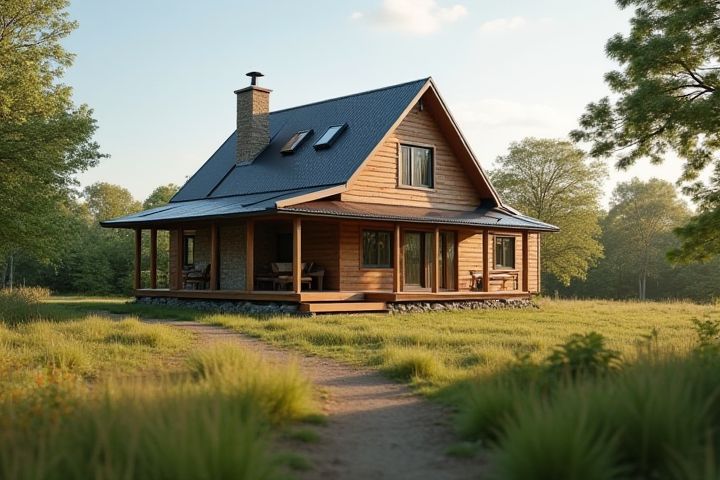
Yes, you can build a house on your own land, provided you adhere to local zoning regulations, building codes, and obtain the necessary permits. Before starting construction, it's essential to conduct a land assessment to ensure suitability for building, including soil quality and drainage. You may also need to hire professionals, such as architects or contractors, depending on the complexity of your design and local requirements. Planning for utilities, such as water, electricity, and sewage, is crucial for a successful build. Be sure to document the entire process to avoid legal issues and ensure your new home meets safety standards.
Can I Build A House On My Own Land
Zoning laws
Zoning laws significantly impact your ability to build a house on your own land, determining the types of structures permitted and the specific regulations that must be followed. It's crucial to check local zoning ordinances, which outline the land use categories, setbacks, density restrictions, and height limitations applicable to your property. Depending on your jurisdiction, you may need to apply for permits or variances if your construction does not comply with existing regulations. Engaging with your local planning department can provide invaluable guidance, ensuring your building project adheres to all zoning requirements and avoids legal complications.
Building codes
Building a house on your own land requires adherence to local building codes, which establish safety standards and regulations to ensure structural integrity and occupant safety. Before starting construction, you must apply for necessary permits and inspections, as these are critical to complying with zoning laws and avoiding potential legal issues. Additionally, you should familiarize yourself with guidelines related to site preparation, material usage, and accessibility features mandated by the building codes in your area. Understanding these regulations will help you design a home that not only meets legal requirements but also enhances your property's value and livability.
Permits and approvals
Building a house on your own land requires obtaining various permits and approvals, essential for compliance with local regulations. These may include a building permit, zoning approval, and environmental assessments, which ensure your construction adheres to safety codes and land use laws. Depending on your location, additional permits such as septic permits or utility connections might be necessary; check with your local planning department for specific requirements. It's crucial to secure these approvals before commencing construction to avoid legal complications and potential fines later on.
Land survey
Conducting a land survey is essential before building a house on your own land, as it helps establish clear property boundaries and identifies any potential zoning restrictions. A typical land survey costs between $300 and $800, depending on the size and location of your property. Knowing the topography, soil conditions, and existing easements can significantly impact your design and construction process, saving you time and money. Hiring a licensed land surveyor ensures compliance with local regulations and can reveal critical information that influences your home's placement and foundation design.
Utility connections
Building a house on your own land typically requires establishing essential utility connections, such as electricity, water, sewage, and gas. You must contact local utility providers to understand the specific requirements and processes, which can include permits, fees, and installation timelines. It's crucial to evaluate the proximity of existing utility lines to your property, as extending these connections can significantly affect your overall budget and construction timeline. Ensuring that you meet all local codes and regulations for utility connections is vital for avoiding delays or potential fines during the building process.
Environmental regulations
Building a house on your own land requires adherence to environmental regulations that vary by location. Before starting your project, it's essential to consult local zoning laws and environmental protection statutes to understand permitted land use and construction practices. You may need to conduct environmental impact assessments, particularly if your land is near protected areas or sensitive ecosystems. Engaging with local authorities can help ensure compliance with regulations and contribute to sustainable building practices.
Budget and financing
Building a house on your land can be a rewarding venture, but it's essential to create a comprehensive budget that encompasses all costs, including permits, materials, labor, and utilities. Research various financing options such as construction loans, personal loans, or home equity lines of credit to find the most suitable solution for your financial situation. Consider potential cost-saving measures like purchasing materials in bulk or opting for a simpler design to stay within your budget. Proper financial planning can ensure you achieve your dream home without incurring overwhelming debt.
Property access
Building a house on your own land is possible, provided you have proper property access. Ensure that the land has legal ingress and egress, which includes rights-of-way and clear access roads. Check local zoning laws for any restrictions or permits required before construction begins, as these can significantly affect your project timeline and feasibility. Your adherence to building codes and regulations will also influence the accessibility and safety of your future home.
Soil quality and topography
Building a house on your own land requires careful consideration of soil quality and topography to ensure structural integrity and suitability. Soil quality plays a vital role in drainage, stability, and foundation design; it is essential to test the soil for compaction, drainage capabilities, and contamination. The topography of your land, including slope, elevation, and vegetation, influences access, water runoff, and potential erosion, which must be addressed in your construction plans. Before proceeding, you may want to consult with a geotechnical engineer to assess these factors and guide you through the building process.
Homeowner associations
If your land is within a Homeowners Association (HOA) jurisdiction, you must adhere to their specific guidelines and regulations. Many HOAs impose design standards, including architectural styles, building materials, and landscaping requirements, which can influence your house construction. Typically, you'll need to submit your building plans for approval to the HOA before starting any construction. Failure to comply with their rules could result in penalties, including fines or mandatory cessation of building activities.
